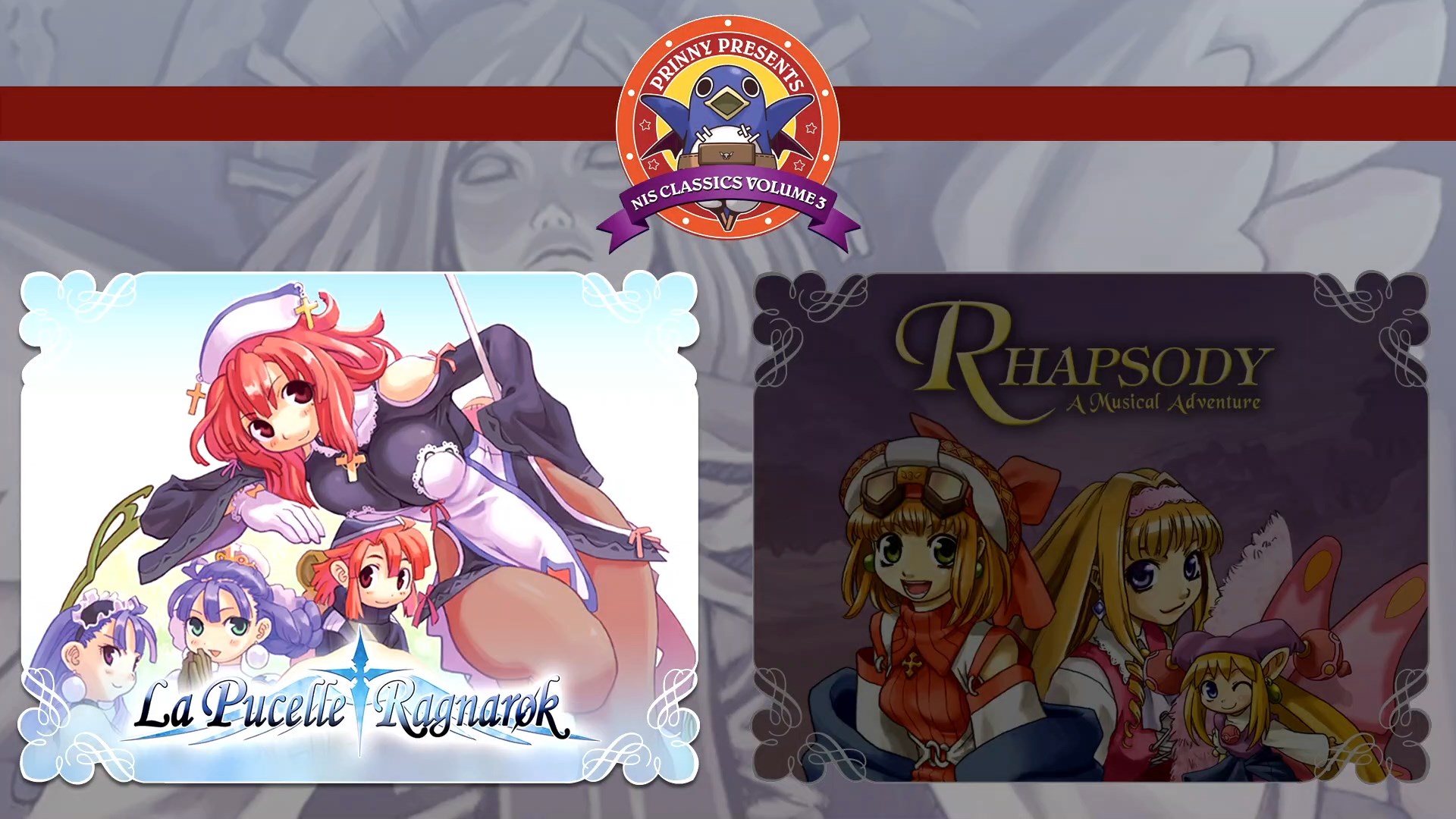Prinny Presents NIS Classics Volume 3: La Pucelle: Ragnarok / Rhapsody: A Musical Adventure
Since last year, Nippon Ichi Software has slowly and somehow silently been releasing their classic titles on the Nintendo Switch and Steam. Many titles from the 2000s to the 2010s have been re-released on modern consoles, some of which for the first time since their initial run. Fan favorites including Phantom Brave, Makai Kingdom, and ZHP are examples of modern classics, yet with the NIS Classics Volume 3, the clock is dialed back even further. The stars of this collection are La Pucelle: Ragnarok and Rhapsody A Musical Adventure, both titles that should ring many bells for long-time NIS fans.
Beginning with the first game of the collection, La Pucelle: Ragnarok was originally a Japanese-only PSP exclusive, serving as an updated re-release of the original PS2 TRPG. This "special edition" included many of the QoL changes inherited from the Disgaea series, as well as altering the plot to segue its connection with the same franchise. That's because, in Japan, La Pucelle was released before the Disgaea series. Some may call it a "prequel" to the Disgaea series itself as its protagonist plays a role in Disgaea 1.

The protagonist centers around Prier, a fledging demon hunter who belongs to a band of demon hunters known as La Pucelle. She is accompanied by her younger brother Culotte, her teacher Alouette, and many others as Prier attempts to become the "maiden of light" meant to vanquish evil.
Unfortunately, Prier lacks the charm and charisma of what's expected from a "pious member of the church," as she is a brash and impatient egoist who only cares about the title "Maide of Light." Many of her peers notice this and call her out on it, which in turn she berates them for overreacting. Despite her childish demeanor, she is serious about her work of vanquishing evil. Perhaps, a bit too serious. This can become her undoing, but first, the gameplay and what makes it different from Disgaea.

As this was released before the series, many of its gameplay elements are uniquely different. The tried and true "move several paces to attack an enemy" formula exists in La Pucelle, however, battles take place in a separate cutscene similar to Fire Emblem. Characters and enemies alike are freely given the chance to counterattack as well.
What's unique to La Pucelle is the Purify mechanic, as demon gates flood the maps that players are on. By Purifying the gates, the source of the demon spawn is sealed as well as any demon within the purification achieving damage. Likewise, monsters can be purified in the same way and upon successful purification, they can fight for your party instead. This is how "recruitment" is handled in La Pucelle.

Perhaps what's best known about this game is the fate of Prier which I've hinted at earlier. As this is considered "common knowledge" in the Disgaea universe, I'll leave the spoiler unmarked as it ties into Ragnarok, but be mindful of major (at the time) plot spoilers anyway. In one of the endings, Prier's negative traits may cause her to become battle hungry for demons to the point that she becomes an Overlord herself. At the time, this was the game's worst ending, but it wound up canon as Disgaea 1 introduced her as a recruitable bonus demon.
In Ragnarok, exclusive to NIS Classics Volume 3, there's a bonus story that adds on to Prier's role as an Overlord, which gives branching endings in its own right. Sure, she may be a fallen demon hunter turned demon but she can either rule the underworld with her human traits intact or give in to her primal urges as a blood-starved demon. As Ragnarok was released in 2009, this was meant to tie with the various fates Prier is shown in each Disgaea game she was a part of.

On the other end of the spectrum, we have Rhapsody: A Musical Adventure, which ties with ZHP as the most unique title of any of the games featured. This is because Rhapsody was one of the first Nippon Ichi Software games released in the west, all the way in 1998 on the PlayStation. As such, the game plays itself like a traditional RPG where instead of moving through towns and venturing maps, players explore settlements and go through environments like a "classic" RPG would.
The story is simple and almost fairy-tale-like as well. The protagonist, Cornet, is a musician who has the power to command puppets with her horn. She wakes up after having a dream about a charming prince, who she ends up meeting in real life after getting ambushed by several cat bandits. Unfortunately, the prince is turned into stone and she must find a way to bring him back while fighting everyone else for his affection.

As I said, compared to all the games covered this is easily one of the more lighthearted ones. It can also be seen through its presentation and music, with common enemies being frogs at first. The actual combat is what many consider the "origins of Disgaea." To me, if La Pucelle was the Street Fighter to Disgaea's Street Fighter 2, Rhapsody is the Final Fight. Cornet and her allies move in a grid, much like the TRPGs before it, but it feels far more "turned base." There was a remake on the Nintendo DS but the Switch version is a port of the PlayStation.
Overall if there was a collection to get, NIS Classics Volume 3 is the one to get with two rare titles in one bundle. La Pucelle Ragnarok was never released in the States and the PlayStation 1 version of Rhapsody is re-released for the first time in 14 years. Each game from each collection represents a certain place in NIS history. It just so happens that this Volume features some of its best games.

NIS Classics Volume 3 is available on the Nintendo Switch and Steam.

